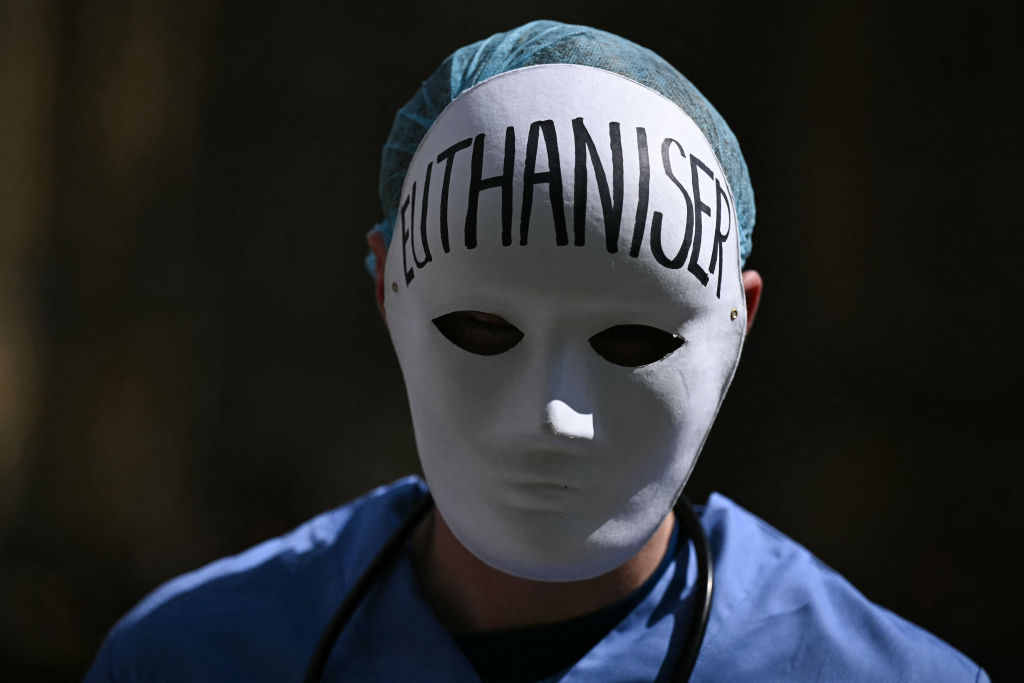Yet another British bill on assisted dying is to be brought forward, and granted a free vote. Is this endless, insistent pressure for legal suicide the end of Christian civilisation, as some have warned? Perhaps, though, in the Anglosphere at least it’s better understood as a contest between two sets of competing Christian values. And while it gives me no pleasure to report this, I suspect its eventual legalisation is inevitable: for it is the logical terminus for our current transnational technological order.
Many Christians oppose the measure on the grounds of Christian obligation to protect vulnerable life, as for example when Anglican bishops helped defeat a euthanasia bill in 2006. But excepting Britain’s minority of Roman Catholics, adherence to beliefs on our duty to dependent others and the sanctity of life is already complicated here by broad public acceptance of legal abortion. And in this context we shouldn’t be surprised to see other Christian-legacy values mobilised in support of euthanasia. Defending the bill, Kit Malthouse used heavily Christian-coded terms such as “peace”, “dignity”, and “compassion”, while supporters of assisted dying such as Esther Rantzen tend to emphasise choice: a liberal frame that draws on 1500 years of Christian thinking on individual autonomy prior to modernity.
Of course, even within the secular frame the concerns over tension between “choice” and coercion are well-rehearsed, as are those over the negative impact it might have on our willingness to protect dependent, vulnerable life. Recently, palliative care doctors and even Labour’s own Health Secretary have voiced such worries, with Wes Streeting warning last month that UK palliative care isn’t good enough for assisted dying to be offered as an alternative. Given current poor provision, he suggested, patients would be “coerced” into ending their lives as the least miserable option.
Yet we can expect this bill to come back again and again until it’s passed — because the logic of technological post-modernity requires it. This doesn’t just apply in the Christian-legacy West, but wherever a country sports an inverted population pyramid. And this is almost everywhere now: the causality is contested, but something about high-tech market society, whether Christian or otherwise, exerts such relentless downward pressure on fertility that global populations are set to shrink almost everywhere, with far-reaching cultural, political, and economic consequences.
And we’re already seeing battles over possible policy solutions. Productivity gains? Robots? Immigrants? Paying people to have more babies? All these have trade-offs and none addresses the scale of the crash. Thus, quietly and usually without any explicit links to the fertility crisis, wherever the baby bust is beginning to bite calls are growing louder for the “problem” to be fixed at the wide rather than the narrow end of the pyramid.
This exists in bleak meme form in millennial jokes about “Day of the Pillow”, a proposed mass-smothering event conducted against their over-numerous Boomer elders. Far more than de-Christianisation, if support for euthanasia is growing this is likely because it’s what Day of the Pillow looks like, once migrated from dark internet jokes into practical policy. This becomes clear once you realise that every polity where the demographic pinch prevails is making the same proposals. For example, since 2020 the call has been raised in China, Japan, and India as well as the West.
From a perspective that views human life as sacred, this looks horrific. But it is a logical endpoint for a technological order whose inorganic growth is in important ways parasitic on the organic kind: exploiting the natural world, for instance, or instrumentalising “human resources” even as it affords women more social status for literally anything other than creating and nurturing those “resources”. And when no effort to rein in this exploitative, anti-life nature seems to have succeeded yet, perhaps the only way out is through. So we can maybe take a crumb of comfort from the likelihood that whatever society survives this now self-devouring culture of death will have done so by refusing its paradigm, and choosing life instead.











Join the discussion
Join like minded readers that support our journalism by becoming a paid subscriber
To join the discussion in the comments, become a paid subscriber.
Join like minded readers that support our journalism, read unlimited articles and enjoy other subscriber-only benefits.
Subscribe